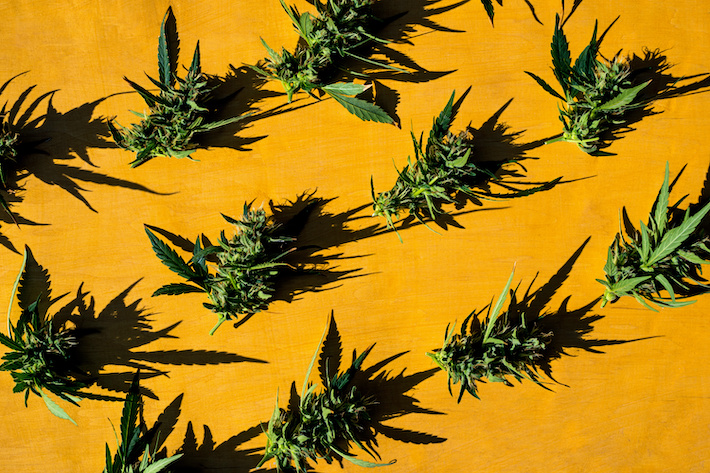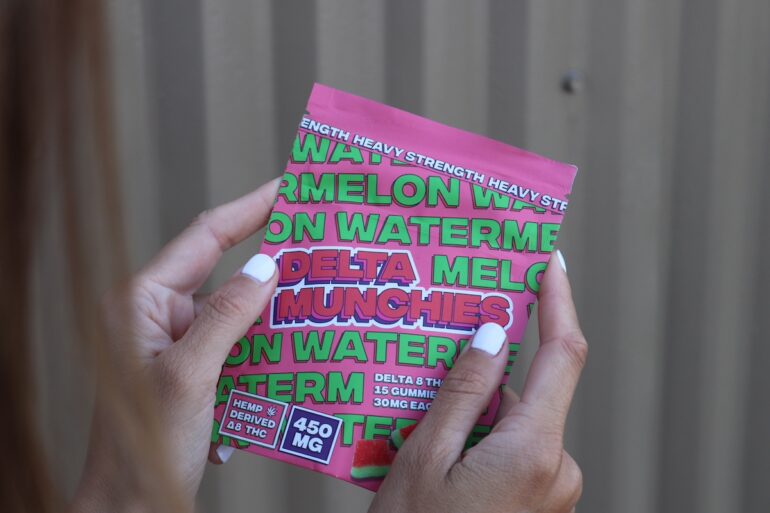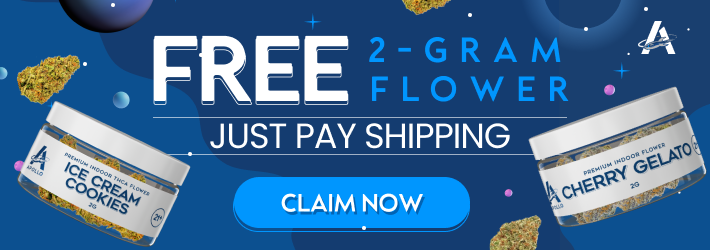Delta-8 THC is legal in Georgia, following the result of a legal battle between a local District Attorney and the industry.
State law took cues from the Farm Bill when it legalized hemp, but the precise details were brought into dispute in early 2022.
This ultimately led to a raid on a distribution center in the state and a long, drawn-out battle of legal decisions and appeals.
Following the conclusion of the legal action, delta-8 THC has been ruled to be legal and all products seized have been returned. Here’s the full story.
Is Delta-8 THC Legal to Sell in Georgia?
Delta-8 THC is legal to sell in Georgia following a ruling from the Court of Appeals, but only to adults aged 21 or over.
House Bill (HB) 213 set up Georgia’s hemp industry, and this legislation follows the guidelines laid down by the 2018 Farm Bill.
Crucially, it uses the same definition of hemp (section 1, 2-23-3(5)/page 2) as the federal bill and makes exemptions for hemp and hemp products under marijuana and THC in the state’s controlled substances code (sections 2 and 3/pages 9 and 10).
From this starting point, the industry progressed much like others across the country, bolstered by the assumption that delta-8 THC was legal in the state.
However, Gwinnett County District Attorney (DA) Patsy Austin-Gatson disagreed, and this has created a lot of confusion in the state since early 2022.
After some back and forth, the court ruled in favor of the industry and affirmed delta-8’s legal status.
It’s likely that delta-8 THC will be ruled to be legal in the state, but at present – especially in Gwinnett County – the situation is unclear.
RELATED: Where Is Delta-8 THC Legal? A State-by-State Map
Gwinnett County vs. Sass Group, Great Vape and Elements Distribution
Gwinnett County’s DA claims that – despite the exemption for hemp products – delta-8 THC is a controlled substance in Georgia. This led to over a year of legal battles, but in November 2023, the Court of Appeals ruled in favor of the industry.
In January 2022, Gwinnett County DA Patsy Austin-Gatson issued a warning stating that delta-8 THC, delta-10 THC and basically any THC other than delta-9 are illegal under Georgia law. The DA’s reasoning was that while delta-9 THC was exempted from the Controlled Substances Act, delta-8, delta-10 and other THC isomers were not.
The reality of the situation is that “hemp” or “hemp products” were excluded from the definitions of both THC and marijuana, as noted in the previous section.
This means that if the products containing delta-8 THC classify as “hemp products,” they are indeed included in the exemption from the controlled substances bill.
Although the 9th Circuit doesn’t cover Georgia and Circuit courts disagree all the time, the 9th Circuit’s reasoning on this issue – that Congress did legalize delta-8 THC derived from hemp – seems equally valid in this case.
RELATED: Why the Ninth Circuit Court Ruling on Delta-8 THC Still Matters
Regardless, in February 2022 a distribution center was raided by police on the basis of this announcement, with around $2 million worth of product being seized. This sparked a lawsuit, which quickly resulted in a 30 day temporary restraining order being granted against Austin-Gatson and her office, then an injunction in April 2022.
Then, in March 2023, the Georgia Supreme Court reversed the decision, meaning that raids, arrests and prosecutions could technically continue, because the original injunction was invalid. The decision, though, was more about “sovereign immunity” than it was about the legality of delta-8 THC products. Specifically, the ruling states that the case should have been dismissed because Austin-Gatson was included on the suit as well as the state.
However, the legal battle continued, with Elements Distribution’s attorney arguing that the state’s seizure of its products was unlawful.
The state had already conceded that outside of food products, delta-8 THC was not a controlled substance in Georgia, but still insisted that it was a controlled substance when in a food product.
However, on November 2nd, 2023, the Court of Appeals in Georgia ruled that the state’s argument was flawed.
The court’s argument is that “hemp” or “hemp products” are excluded from the definition of marijuana in state law, so it ultimately doesn’t matter whether delta-8 THC food products are included in “hemp products,” because delta-8 is still “hemp.”
In short, delta-8 THC can still be sold in Georgia.
Delta-8 THC Legislation Timeline for Georgia

Georgia passed HB 213 in 2019, and this was assumed to have legalized delta-8 THC until the Gwinnett County DA issued a contrary opinion in 2022.
HB 213 was signed into law on May 10th, 2019, and this is the only piece of legislation that has been passed relevant to delta-8 THC.
As discussed in detail above, Gwinnett County DA Patsy Austin-Gatson issued a non-binding opinion in January 2022 stating that delta-8 THC – along with delta-10, delta-7 and other THC isomers – are illegal in the state.
This created much confusion, which was not cleared up until November 2023, when the Court of Appeals ruled in favor of the industry.
In April 2024, the state passed Senate Bill (SB) 494, establishing a new definition of “consumable hemp product,” banning the sale of consumable hemp products to anyone aged under 21 and clarifying the rules around edible products.
Can Delta-8 THC Be Added to Food?
Delta-8 THC cannot be added to most food products in Georgia, but gummies and beverages are allowed.
The FD&C Act makes it illegal to add delta-8 THC (or CBD) to food that will enter interstate commerce, according to the FDA’s reading of the law.
After some confusion surrounding the court case, Georgia passed SB 494, which set up rules (section 2-23-9.2.(c)(2) and (3)/page 25-26, lines 623-630) around allowable food products.
Generally speaking, you can only sell food products with hemp if they are gummies or non-alcoholic beverages, and they cannot be sold interstate.
Can You Buy Delta-8 THC in Georgia?
Delta-8 THC is available to buy in Georgia from both physical and online stores.
RELATED: The Best Delta-8 THC Brands, Reviewed
Delta-8 Alternatives You Can Legally Buy in Georgia
Georgia’s hemp law follows the guidelines laid down by the 2018 federal Farm Bill, and so hemp delta-9, delta-10, THCV, HHC and other hemp-derived cannabinoids are also legal in the state.
Age Restrictions
Only adults aged 21 or over can purchase consumable hemp products in Georgia. This was established by SB 494 (section 16-12-241(a)/page 30, lines 727-729).
Public Consumption
Georgia’s hemp law doesn’t discuss public use of delta-8 THC, so technically there is no restriction on where you can use it.
However, it’s illegal to smoke in most indoor public places in the state, so you can’t smoke delta-8 THC there either.
As in many states, there is no specific prohibition on using delta-8 THC anywhere you like – aside from existing rules on smoking indoors – but it is probably not wise to use it in public. It’s likely that it would be confused for marijuana if you were smoking it.
Edibles probably wouldn’t lead to many issues, but if you do use them in public, you should have a Certificate of lab Analysis (COA) or a receipt with you so you can prove that it’s hemp.
Driving Under the Influence of Delta-8 THC
It’s illegal to drive under the influence of delta-8 THC in Georgia.
Georgia’s DUI law states that it’s illegal to drive “under the influence of any drug to the extent that it is less safe for the person to drive.”
This doesn’t refer to a specific substance, so since delta-8 THC is clearly “any drug” and it does impair you, it’s covered by this part of the law. Whether paragraph (a)(6) applies – which states that it’s illegal to drive with “any amount” of a controlled substance in your blood – is dependent on the outcome of the ongoing legal action.
Punishment in the first instance includes a fine of between $300 and $1,000 and between 10 days and 12 months in prison, a minimum of 40 hours of community service and a clinical evaluation for substance abuse issues.
RELATED: Can Delta-8 THC Make You Fail a Drug Test?
Can You Travel to Georgia With Delta-8?
Traveling to Georgia with delta-8 THC is legal, because it is legal in the state and under the federal Farm Bill.
Theoretically, delta-8 THC is legal in Georgia and it is widely considered to be legal at the federal level, so you can take it into the state.
The Transportation Security Administration (TSA) points out that hemp is permitted on flights, and even says that they aren’t particularly interested in marijuana. As long as the courts rule that Georgia did legalize delta-8 THC, you’ll be able to bring it into the state.
In the meantime, it’s a little unclear. Provided you bring a COA for the product in question, it’s likely to be OK, but it depends a lot on whether you interact with police officers and what their attitude is.
Closing Thoughts: The Future for Delta-8 in Georgia
The conclusion of the court case between Sass Group et. al. and the state of Georgia meant that the state had to clarify its rules, and the passage of SB 494 did just that.
Following this legislation, it’s unlikely there will be further changes until the new version of the Farm Bill is passed.
The court case discussed above gutted the rules Georgia had intended surrounding hemp in foods. SB 494 introduced the category of “consumable hemp products” to rectify this issue, and clarified which edible products are allowed, as well as establishing an age limit for hemp products. This is likely to be the only action taken on hemp in the state this year.
However, the update to the federal Farm Bill may bring in other limitations, for example banning intoxicating products.
The conclusion of this process is the most important thing to watch when it comes to Georgia hemp law.
Editor’s note: This article was updated on June 5, 2024, to reflect the new bill that made delta-8 THC legal in Georgia.

